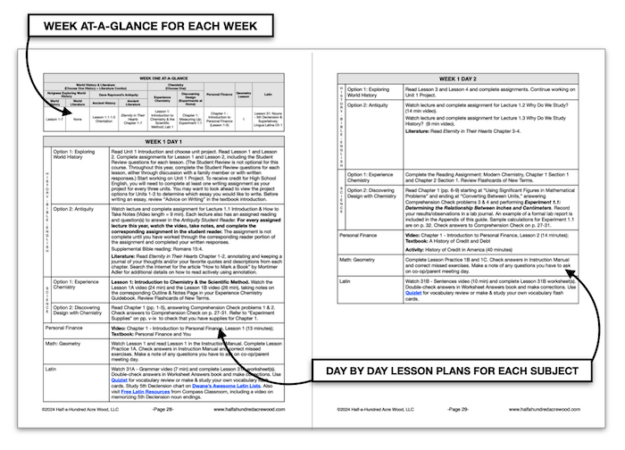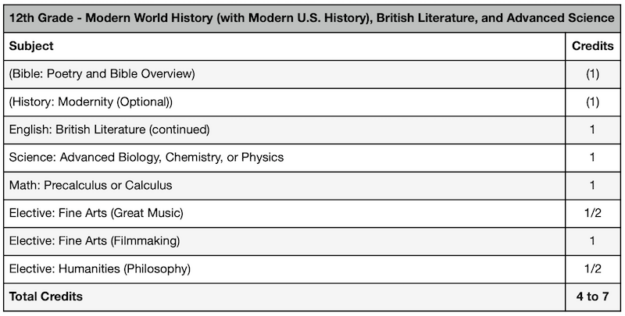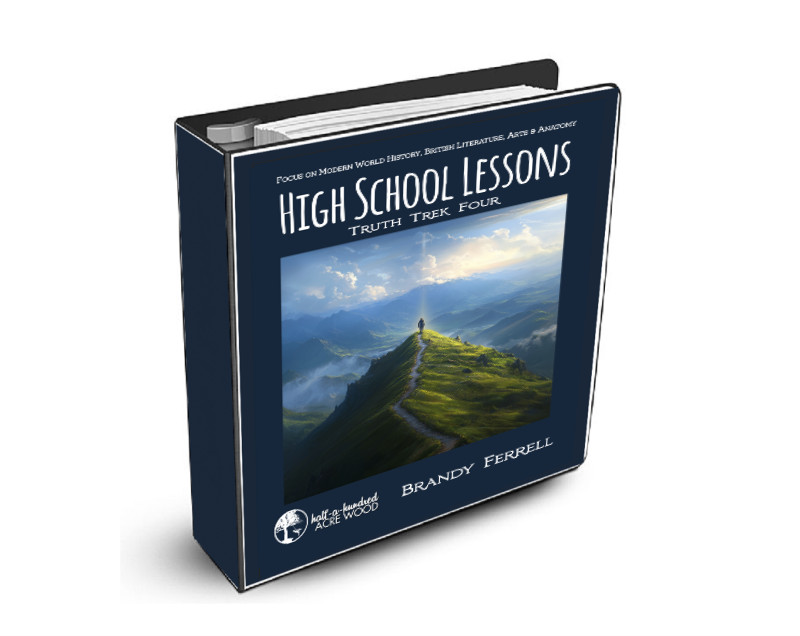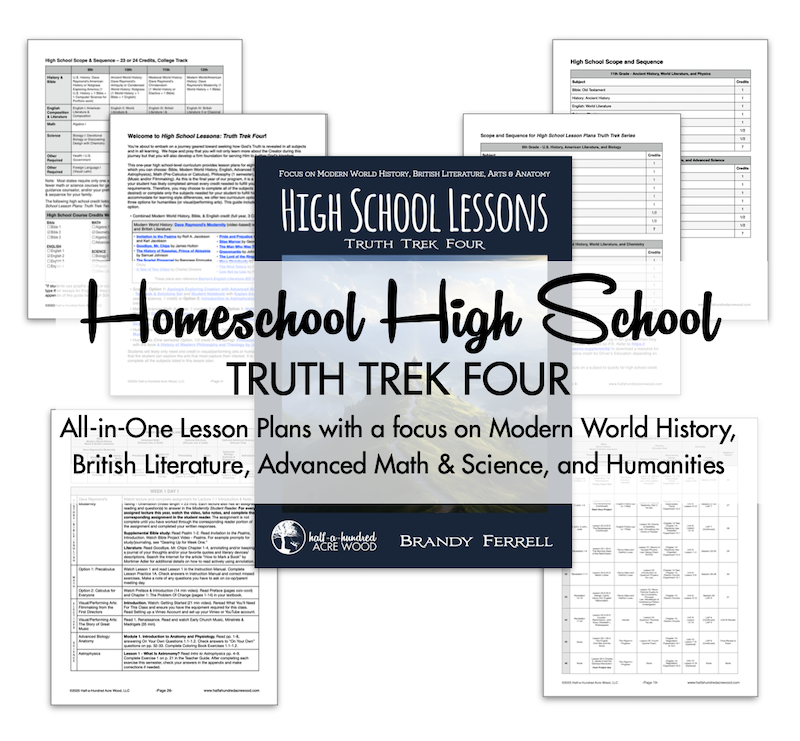Intimidated by homeschooling high school? You don’t have to be! We’ve done the planning for you with High School Lesson Plans: Truth Trek series.
A few years ago, we started to pursue a long-term vision of developing a complete course of study for Grades 1-12, one in which families can experience many of the benefits of a one-room schoolhouse atmosphere. As a first step towards that end, we offered a suggested sequence along with curriculum recommendations for studying high school subjects as they correspond with each program within our Mission: Great Commission Curriculum series. Since then, we have embarked on the long process of evaluating high school curriculum with our teenagers using our corresponding lesson plans for each curriculum choice. We’re excited to announce that after years of curriculum evaluation and lesson planning, our fourth and final year of Homeschool High School Lesson Plans is finished!

What it entails
- Parent help. Co-op help. If you’re not sure how to lay out lesson plans over the course of the year or what to do when you meet with your student to discuss what they’re learning, these lesson plans provide that support for you. Each week concludes with a co-op or parent meeting day in which students present and discuss material with their parents or with other students (in the case of a co-op setting). Prompts are included for discussion.
- Engagement with family. High school students often become disconnected from the rest of their family as they earn high school credit, so our aim was to develop lesson plans that would step them and their parents through learning the same general topics at a deeper and more challenging level – and with curriculum that qualifies as high-school level material. By having these same general topics correspond to the resources used in our Mission Great Commission series, high schoolers can remain engaged and contribute what they’re learning to family morning-time discussions because of the overlap between material.
- College prep. Because we wanted to do our best in preparing students for college, we also wanted to ensure that our high schoolers could successfully transition to college and/or successfully earn college credit via testing before offering our plans to others. In these lesson plans, we’ve taken our favorite courses, scheduled them out over the course of the year, and provided a few suggestions for how to earn college credit as your student works his/her way through high school using CLEP testing.
- Complete, four-year program! This set of lesson plans is Truth Trek Four, intended for 11th graders but may be used for any student needing lesson plans for Bible, World History (with Medieval focus), English, Lab Science (Physics), Math (Algebra 2), Visual/Performing Arts (High School Art – Drawing & Painting), P.E. (1 semester), and/or Career Readiness (1 semester). Depending on the interest expressed by homeschooling families, our goal is to create an entire scope and sequence of lesson plans for the four years of high school. Trek One was released in May 2023, Trek Two was released in March 2024, Trek Three was released in March 2025. Truth Trek Four was released in April 2025.
The most challenging part of this vision has been simply…. decision. There are many different curriculum options, and there are many different learning styles. Education is not a one-size-fits-all endeavor. Considering this, we have provided two different options for advanced science and advanced math and three options for humanities. You can find out details about each curriculum option at the bottom of this post. Also, there is flexibility on how to fulfill elective credits such as Visual/Performing Arts or humanities. Truth Trek Three and Truth Trek Four provide different options for fulfilling these credits.
The Truth Trek High School Lesson Plans are meant to provide a framework to equip parents to continue to teach their children at home through the intimidating high school years. And our hope is that this will provide a catalyst for meaningful discussion and memory-making with your high schoolers!
The Curriculum Choices
If you’re interested in using our lesson plans, Trek Four will provide a full, 36-week schedule for the following subjects:

As this is the final year of our program, it is a year of options. Many students will have the majority of their required credits completed by their senior year if they have completed the other levels in the Truth Trek series. In Truth Trek Four, we’ve included such optional courses as filmmaking, music appreciation, and philosophy. Students can complete as many or as few courses as they’d like as long as they have earned the credits they need 1) to graduate and 2) for admission into the college or degree program of choice (if they intend to go to college).
This one-year high school-level curriculum provides lesson plans for eight high school subjects: Bible, Modern World History, English, Advanced Science (Biology II or Astrophysics), Math (Precalculus or Calculus), Visual/Performing Arts or humanities (Music, filmmaking, or philosophy). You may choose to complete all of the subjects or complete only the subjects needed for your student to fulfill his/her high school credits. To accommodate for various interests, we offer two curriculum options for Advanced Science and Advanced Math and three options for humanities (or performing/visual arts). This guide includes lesson plans for each option. Please note that if you do not use Dave Raymond’s Modernity, these lesson plans will not provide the composition you need for English credit because the composition assignments within our Truth Trek 4 Guide are assigned to correlate with Dave Raymond’s Modernity.
- Combined Modern World History, Bible, & English credit (full year, 3 Credits)(3 Credits):
- World History from the 1600s (full year): Dave Raymond’s Modernity (video-based; 30% off until April 16, 2025), along with the following World and British Literature. Our Truth Trek Lesson Plans include the World and British literature and composition assignments to provide a corresponding literature credit.
- Invitation to the Psalms by Rolf A. Jacobson and Karl Jacobson
- Goodbye, Mr. Chips by James Hutton
- The History of Rasselas, Prince of Abissinia by Samuel Johnson
- The Scarlet Pimpernel by Baroness Emmuska Orczy
- A Tale of Two Cities by Charles Dickens
- Pride and Prejudice by Jane Austen
- Silas Marner by George Eliot
- The Man Who Was Thursday by G.K. Chesterton
- Greenmantle by John Buchan
- The Lord of the Rings by J.R.R. Tolkien
- Mere Christianity by C.S. Lewis
- The Nine Tailors by Dorothy Sayers
- Live Not by Lies by Rod Dreher
- These plans also reference Barron’s English Literature (EZ-101 Study Keys).
- Note: If your student is uncomfortable with responding to essay prompts and needs more formal instruction on essay writing, we recommend using IEW Structure and Style for Students Level C (Year 1 or Year 2) or University Ready Writing.
- World History from the 1600s (full year): Dave Raymond’s Modernity (video-based; 30% off until April 16, 2025), along with the following World and British Literature. Our Truth Trek Lesson Plans include the World and British literature and composition assignments to provide a corresponding literature credit.
- Choose from two options for Advanced Science (full year):
- Apologia Exploring Creation with Advanced Biology (Anatomy & Physiology) – Textbook & Solutions Set and Student Notebook with Kaplan Anatomy Coloring Book (lab science, 1 credit) or
- Option 2: Introduction to Astrophysics (non-lab science, 1 credit)
- Math – Advanced Math (full year, 1 credit or 2 credits): Option 1: Math U See Precalculus and/or Option 2: Calculus for Everyone (30% off until April 16)
- Humanities: Visual/Performing Arts (Full Year Option, 1 credit): Filmmaking from the First Directors (30% off until April 16)
- Humanities: Visual/Performing Arts (One semester Option, 1/2 credit in the fall): The Story of Great Music (30% off until April 16)
- Humanities (One semester Option, 1/2 credit in the spring): Philosophy: Consequences of Ideas (30% off until April 16) with the book A History of Western Philosophy and Theology by John M. Frame
If your student is using a different program for any of these subjects, a blank planning page is provided so that you can insert your own lesson plans for those subjects.
The introduction to the Truth Trek Lesson Plans includes details about each program so that you can make the best decision regarding the options provided for science and electives. You can also scroll down to the bottom of this post for a short summary of each program to help with your curriculum choices.
Note that Dave Raymond’s Modernity, Calculus for Everyone, Filmmaking from the First Directors, The Story of Great Music, and Philosophy: Consequences of Ideas is 30% off until April 16, 2025 using code SPRING30!
Check it out!
If you’d like to download a sample of the first week of Homeschool High School Lesson Plans: Truth Trek Four, click here.
If you have questions, feel free to hop down to the comments or contact us via email at halfahundredacrewood @gmail.com (no spaces).
For families with children in Grades 1-8, you can either use the Mission Faith Forgers program which incorporates corresponding world history themes at the elementary and middle school levels, or the Mission Lasting Liberty Program which incorporates American history during the age of modernity. This provides a unified approach to teaching and learning in the home as all students in Grades 1-12 study similar content areas. To provide students in Grades 1-8 with a corresponding science, we recommend Our Universe from God’s Design for Heaven and Earth if your high schooler is taking Astrophysics or The Human Body from God’s Design for Life if your high schooler is taking Anatomy & Physiology.
High School Lessons – Truth Trek Four
 Streamline high school with all-in-one lesson plans for courses written from a Christian worldview! This one-year high school-level curriculum provides 36 weeks of lesson plans for eight high school subjects from which you can choose: Bible, Modern World History, English, Advanced Science (Biology II: Anatomy or Astrophysics), Math (Pre-Calculus or Calculus), Philosophy (1 semester), and Visual/Performing Arts (Music and/or Filmmaking). As this is the final year of our program, it is a year of options.
Streamline high school with all-in-one lesson plans for courses written from a Christian worldview! This one-year high school-level curriculum provides 36 weeks of lesson plans for eight high school subjects from which you can choose: Bible, Modern World History, English, Advanced Science (Biology II: Anatomy or Astrophysics), Math (Pre-Calculus or Calculus), Philosophy (1 semester), and Visual/Performing Arts (Music and/or Filmmaking). As this is the final year of our program, it is a year of options.
Each week consists of four days of instructions for students and wraps up with a “Co-op or Parent Meeting Day” that walks parents or co-op teachers through a discussion of the current week’s topics and confirms that the student understands the material. To download a sample, click here.
Format: PDF Download (Mac & PC Compatible), 247 pages. For individual family use only. A link to download the PDF Document will be automatically sent to the Paypal email address used at checkout.
Suggested grades: 12th grade (or high schoolers who need to take a course in any of the following: Bible, Modern World History, English, Advanced Science (Biology II or Astrophysics), Advanced Math (Precalculus or Calculus for Everyone), Visual/Performing Arts and/or Humanities (Music Appreciation, Filmmaking, and/or Philosophy).
PDF Price: $39.95 Half price until April 30, 2025: $19.95


The Options: Advanced Biology vs. Astrophysics
The introduction to the Truth Trek Lesson Plans includes details about each program so that you can make the best decision regarding the options provided. Students who have used Truth Trek One, Two, and Three will have completed a course in biology, chemistry, and physics and may not need a fourth year of science. In Truth Trek Four, we are providing two different options for an advanced science for students who either need one more science credit or would like to continue the study of science beyond the core disciplines: Apologia Exploring Creation with Advanced Biology and Introduction to Astrophysics.
- Apologia Exploring Creation with Advanced Biology (Biology II) is a Christian textbook-based course that includes lab experiments and dissections, but Apologia also offers live online classes and self-paced recorded classes. It is the recommended option for students who are going into nursing or a related medical field. For this course, students will need the Textbook & Solutions Set and the Kaplan Anatomy Coloring Book. We also strongly recommend the Student Notebook, as it includes the quarterly reviews, case studies, and optional lab experiments that are not included in the textbook. This course also requires the purchase of the Advanced Biology Slide Set w/Blood Typing Kit, and the Advanced Biology Dissection Specimens Set. Students must keep a laboratory notebook as a record that they completed this course as a laboratory-based science credit.
- Introduction to Astrophysics (non-lab science, 1 credit). Because astronomy is a subject that often instills an awe of the Creator (and is also part of the classical quadrivium), Introduction to Astrophysics is also offered as an option for advanced science. Although it is not a lab science course, it includes five projects and other activities. A telescope is recommended for this course.
The samples at the the following links will help you with choosing the program that best fits your family.
The Options: Precalculus vs. Calculus for Everyone
For the final year of high school, we have provided two options for advanced math. College-bound students going into the physical sciences will want to consider taking both courses concurrently.
Calculus for Everyone is a classical approach to calculus which presents the “problems” that arose through history that led to the eventual invention of calculus. The only prerequisite for this course is Algebra I, as it teaches the concepts of calculus using only the functions introduced in Algebra I. Because it removes the more difficult trigonometric and logarithmic functions in learning the foundational concepts of calculus, students are better able to get a big-picture overview of what Calculus is and thus develop a stronger foundation for more advanced calculus in future years. Because of its specific focus on providing a deep conceptual understanding of calculus, Calculus for Everyone will not introduce trigonometry, logarithms, or other concepts that are normally included in an advanced math course. Read a more detailed review of this program and try sample lessons here.
Math U See Precalculus provides a foundation in the more advanced trigonometric functions, composite functions, exponential functions, logarithmic functions, as well as sequences, series, limits, and more. If a student is going into a future math- or science-related field of study, this course will likely be required. Check out a sample lesson here.
The Options for Humanities: Filmmaking vs. Music vs. Philosophy
Filmmaking from the First Directors. If students have not yet earned a visual/performing arts credit (or a computer technology credit) and/or would like to learn about filmmaking, this course will provide a framework for videography, storytelling/script-writing techniques, directing films and editing footage. This course may be used as an introduction to filmmaking, or it can assist experienced YouTubers in better developing storytelling and videography skills.This course requires audio/video equipment and computer software for editing their footage (such as iMovie or other similar programs). Because the process of screenwriting, filming, and editing requires a significant amount of time and commitment, students should only take this course if they are interested in filmmaking. Read a more detailed review and try sample lessons here.
- Humanities: Visual/Performing Arts (One semester Option, 1/2 credit in the fall):
- Humanities (One semester Option, 1/2 credit in the spring): Philosophy: Consequences of Ideas with
The Story of Great Music (1st semester with an option to continue 2nd semester if desired). If students have not yet earned a visual/performing arts credit and/or would like to learn about classical music, The Story of Great Music will provide a foundation for learning the characteristics of different musical eras as well as famous composers and their works. Although this course requires no previous experience or training in music, it can provide a historical overview for even experienced music students to better connect their knowledge of musical periods, composers, instruments, and performance styles.
The lesson plans in this Truth Trek Guide schedule the Story of Great Music lessons over first semester (Weeks 1-18) to receive 1/2 credit in humanities or visual/performing arts with an option to extend this course into second semester if they would like to earn a full credit in the arts. The course includes readings, video performances, quizzes, and audio/video playlists. If students extend the course into second semester, they will review the material while adding in a listening journal, research papers, and projects as they dig deeper into the story of great music.
Philosophy: Consequences of Ideas (2nd semester) provides an overview of philosophical thought throughout history and thus equips students with analyzing the philosophies of the world within the context of a Biblical worldview. Although philosophy and worldview studies are not required according to state education standards, these subjects are invaluable in equipping our teens (and ourselves!) to live as ambassadors for Christ in a fallen world. As a wise king once said, “What has been will be again, what has been done will be done again; there is nothing new under the sun.”
This course will be used during second semester (Weeks 19-36) and includes video lectures from R.C. Sproul’s Consequences of Ideas, primary source documents featuring each philosopher’s words (available as PDF or online readings), and assigned readings from the book A History of Western Philosophy and Theology by John M. Frame. Students will also keep a “philosophy journal” throughout the semester.
If you have any questions, feel free to contact us at support@ halfahundredacrewood.com (no spaces).



